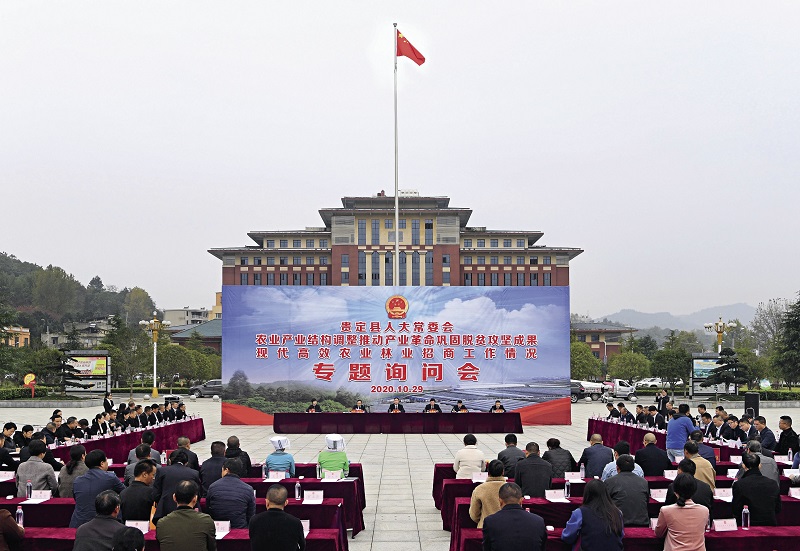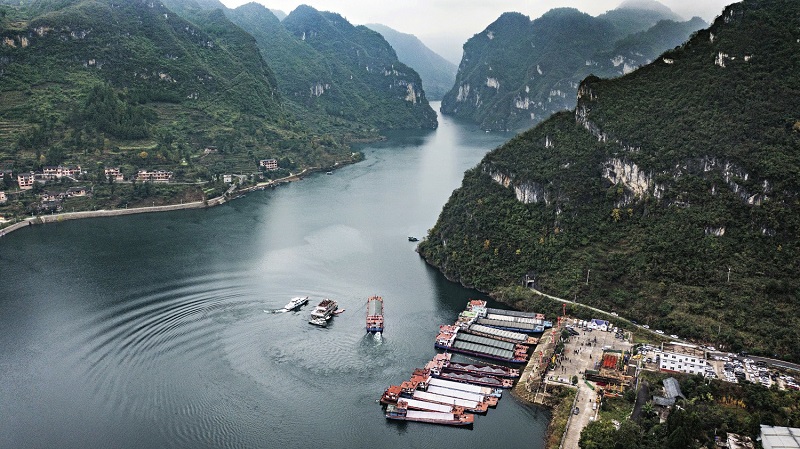The whole-process people's democracy is thriving across Guizhou Province.
The whole-process people’s democracy of China, a model of socialist democracy that covers all aspects of the democratic process and all sectors of society, is a true democracy that works. But to ensure that it delivers, strenuous efforts are needed to see that it is truly practiced by people’s congresses and their standing committees at the local level and contributes to solving issues of broad concern among the people.
In Guizhou, an inland province in southwestern China, people’s congresses of all levels and their standing committees are committed to upholding the principle that the people are masters of their own country in all policies and measures they adopt, and to ensure that the principle is materialized in the work of all Party and government departments. They are doing their best to meet the people’s expectation for a better life, addressing local residents’ concerns through legislation, supervision, and discharge of other duties.

A meeting is held on a plaza in Guiding County, Guizhou Province by the local people’s congress to solicit people’s opinions regarding the local government’s work on October 29, 2020. (Photo courtesy of Wang Min)
Legislation
On January 6, 2021, 72 people representing different walks of life and entities in Zunyi, a major city in Guizhou, gathered in the Fenghuang Mountain Conference and Exhibition Center for a hearing on a draft statute regarding the protection of the Feng-huang Mountain National Forest Park. The park has eight springs, which attract throngs of people to fetch water from them around the year. There have long been debates among local residents as to whether or not this activity is proper and safe, for the water fetchers and the eco-environment alike. A hearing was therefore held on whether restrictions should be implemented on taking spring water from the park.
“Spring water in the Fenghuang Mountain is a gift from nature and has nourished generations of people here. It cannot be exhausted by our generation. We should use it properly,” said Li Zuming, a representative from the general public.
Another attendant, Wang Chunxia, voiced another opinion. “The spring water has not been tested by relevant authorities. Is it safe to drink? Since most of the people who go fetch water are elderly, is it safe for them to go get the water? In addition, when too many people go to the springs, they damage the vegetation in the region by walking on it. So, I suggest that a ban or restriction be implemented on taking water from the springs.”
“These issues deserve our attention. Water taking should be allowed within the framework of certain restrictions and with safety measures in place. For instance, we could add a locked coverage to protect the water from poison and animal excretion and control the daily number of people who fetch water to prevent over-extraction,” said Lei Pengyuan, a member of the city’s public health administration.
Li Chengqiang, a representative from the local water resources authorities, cited the laws already in place to explain restrictions on using the spring water. “Since no existing laws, including the Water Law of the People’s Republic of China, Regulations of Guizhou Province for Conservation of Water Resources, and Regulations of Zunyi City for Protection of the Xiangjiang River, contain provisions prohibiting residents from taking water from the springs, no restriction can be imposed. But extracting spring water for engineering and commercial purposes must be banned, as water resources are limited and fragile.”
All participants at the hearing expressed concern for the safety of the spring water and conservation of water resources. After deliberation, they reached the agreement that while respecting citizens’ right to the spring water, restrictive measures and better management would be put in place to stop commercial extraction and ensure safety, good order, and sustainability.
“Lawmaking is an essential duty of the people’s congress. At every stage of this process, we solicit and adopt the opinions of all parties concerned, and follow a democratic, open-door approach to make the whole-process people’s democracy a reality,” said Fan Yuanping, chair of the Standing Committee of the Zunyi Municipal People’s Congress. During the process of drafting the Regulations of Zunyi City for Protection of the Fenghuang Mountain National Forest Park, which came into effect last December, the municipal people’s congress held eight public hearings on various issues related to public interest, in an effort to make the statute fully reflective of public opinion.

The Wujiang Waterway that was previously suspended for nearly 20 years due to construction of cascade hydropower stations along the Wujiang River resumes its full-scale voyage on November 16, 2021. (Photo by Tao Liang, Xinhua News Agency)
Supervision
“I have participated in such meetings for three consecutive years. It is a channel for us to both learn about the working of the government and exercise supervision over it,” said Yang Shenggang, a farmer in Yanshan Village, Guiding County in Qiannan Buyi and Miao Autonomous Prefecture. The meeting Yang mentioned here is a public meeting usually held in a neighborhood square during which local officials give policy briefings and take questions from deputies of the local people’s congress in the presence of local residents.
“The county has managed to attract investment in agricultural businesses. Some of them are modest in size, but still play an important role in boosting local employment and economy. My question for the rural affairs bureau is, could you introduce preferential policies to help these businesses grow bigger and stronger so that they can play a bigger role in the local economy?” asked Wang Yong, a deputy to the county people’s congress, at a square meeting on investment in agriculture and forestry in Guiding on October 29, 2021.
“Rosa roxburghii is a feature product of our county. But some plantation bases are handicapped due to a lack of funds and technical support. My question for the forestry bureau is, do you have any plan to provide guidance and services for these plantation bases?” asked Chen Xingju, a deputy to the Yanshan Town People’s Congress.
Each question raised by deputies was answered by members of relevant departments. To Wang Yong’s question, a government official replied, “The county government will intensify endeavors to promote preferential policies, fulfill our promise for the businesses that have signed the agreement, and communicate with those who have moved in but have not yet signed the agreement, to win their support and understanding.” In answer to Chen Xingju’s question, an official gave a straightforward reply, saying, “The county’s bureau of market supervision and administration will direct more efforts toward cultivating agricultural technicians and attracting more from other regions, with the focus on technical management, processing, logistics, and marketing of our feature products, including kiwifruit, Rosa roxburghii, and Camellia oleifera. In addition, we will also establish a database on such experts, and institute a system for them to help agricultural businesses solve the problems the latter may have in a timely manner.”
“The people’s congress must open its door to the public when exercising oversight and listen to as many people’s views and suggestions as possible. This is how the Party’s mass line is applied in the work of the people’s congress, and also what the whole-process people’s democracy is meant to be,” said Ling Yi, chairman of the Standing Committee of Guiding County People’s Congress. The question and answer sessions held at neighborhood squares have increased the transparency of the local congress’ work and heightened the public’s interest in being engaged in overseeing the government.
“Since 2015, we have organized inquiry sessions to discuss such issues as targeted poverty alleviation, public health, and the business environment. They have been effective in helping solve the issues that bothered the people,” Ling said.
Deputies’ Proposals
“We were overjoyed when we watched 14 cargo ships toot their horns as they left the Luowang River Dock at the Kaiyang Port,” said He Xianmei, a deputy to the Guizhou Provincial People’s Congress, recalling the day shipping resumed along the entire Wujiang River on November 16, 2021.
Wujiang is one of the eight largest tributaries of the Yangtze River, and has been an essential water passage connecting Guizhou with other regions since ancient times. However, starting in 2003, construction of hydropower projects caused the suspension of shipping along the river, and hope for its resumption was pinned on the upgrading of shipping routes.
“The value of deputies’ proposals lies in the fact that they address the issues that vex the people,” He said, then added, “Based on this belief, as representatives who carry the expectations of the people, Zhang Xu, Xi Ning, Qin Zhikun, Yang Yanqin, and myself, talked to members of the public to learn about the situation and collected their opinions. After this, we made proposals to support shipping on the Wujiang River, boost the shipping industry along the river, and build up the Wujiang shipping routes to fuel high-quality development.”
Their efforts paid off. Projects to increase Wujiang’s shipping capacity have been included in the 14th five-year plans of both the Ministry of Transport and Guizhou Province for the local water transport sector. “Our proposals received a direct response from relevant departments,” He said with delight.
Over recent years, Guizhou has spent more than RMB 5 billion on the Wujiang River to build a 431-kilometer-long Grade 4 waterway, eight ports, 15 500-ton public berths, and shipping facilities at the Goupitan, Silin, and Shatuo hydropower stations.
“Deputies to the people’s congress are selected from the people, represent the people, and play a significant role in exercising the whole-process people’s democracy,” He concluded. Today it takes only three days for a ship carrying 6,800 tons of phosphate rock from Guizhou to reach the Wangbeituo Dock in Chongqing, where the cargo will be loaded into a larger vessel bound for Wuhu Port in Anhui Province about 1,500 kilometers away. Expedited transport has brought greater convenience to people’s lives.
WANG JIALIANG & WANG HELIN are reporters of Legal Daily.